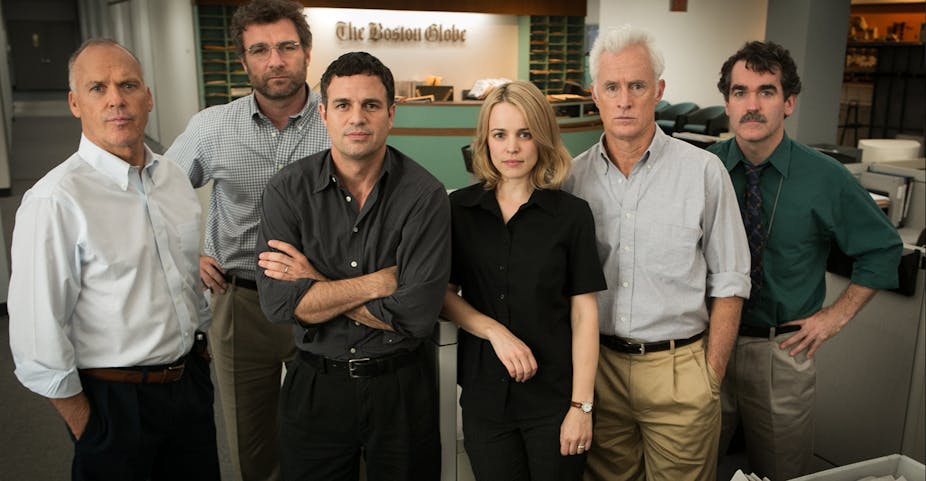I have been in Tasmania these last few days, by coincidence at the same time as the royal commission has held hearings in Hobart into paedophilia in the Church of England in which senior Christian clerics have been apologising for the sexual abuse of children and young people. Meanwhile the new film Spotlight, directed by Tom McCarthy, has been winning multiple industry awards (and is a hot tip for Oscar success).
Spotlight tells the story of how, in the early 2000s, investigative journalists in Boston broke the first stories of child sexual abuse by the Catholic Church, setting off a wave of scandals which has spread around the world and has still not subsided.
In an era when journalists come in for a lot of stick from politicians and publics regarding their propensity for bias, or for sensationalism and sleaze in the pursuit of audiences, the film reminds us why journalism matters, and the good work so many times of its practitioners do on our behalf.
In Spotlight, the journalists and their editors at the Boston Globe take on one of the world’s most powerful and secretive institutions. They expose the moral corruption that great and (until that moment) largely unaccountable power breeds.
Like the iconic All The President’s Men of 40 years ago, Spotlight is a work of popular cinematic art which celebrates the good things that journalists do, and the risks they often take in the process. Where last year’s Nightcrawler depicted the very worst that mainstream journalism can be, with its villainous sleaze monger played to creepy perfection by Jake Gyllenhaal, Spotlight represents the journalist as hero, and highlights the function of journalism as a Fourth Estate telling truth to power in the manner without which our modern democracies could not survive.
My 2010 book about journalists in film found – to my surprise, given that many journalists claim to get an unfairly bad press in the movies – that the majority of films about journalist produced in the period of the study portrayed them as heroes rather than villains. Notable examples included Good Night and Good Luck, The Insider and State of Play.
I argued then that mainstream cinema had emerged as the key platform in popular culture where our liberal democratic societies talk about journalism and the essential role of elite scrutiny which, at their best, journalists play.
The exposure of systemic child sexual abuse (not forgetting the emotional and physical abuse dramatised in films like The Magdalene Sisters and Philomena), by a depressing array of trusted religious or quasi-religious institutions in which self-proclaimedly holy men (and women too) have had unsupervised access to children in their care exemplifies the importance of journalistic scrutiny of power.
Without the efforts of the brave journalists who have uncovered and told these stories, from Boston to Brisbane, who can doubt that many of the perpetrators would still be in their posts, protected by the church leaders now lining up to confess and apologise for their cover-ups before royal commissions?
As a journalism researcher and educator I salute those investigative reporters, and welcome the positive critical reception tended to Spotlight and earlier films of the journalism-as-hero genre. That praise – and it barely matters if the films are as good as the reviews say – reminds us that fearless, forensic, watchdog journalism is still recognised and valued in the era of listicles and Google-style news aggregation.
Everyone who cares about the survival of quality journalism in our digitised societies should see the film, and continue to support well-resourced news media as those who work in them struggle to meet the challenges of new technology and fractured business models.

